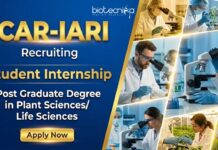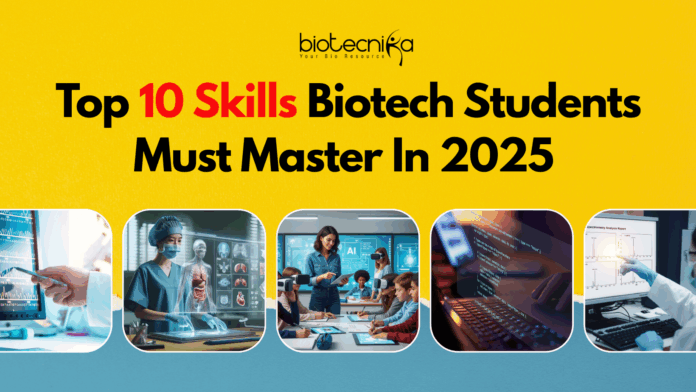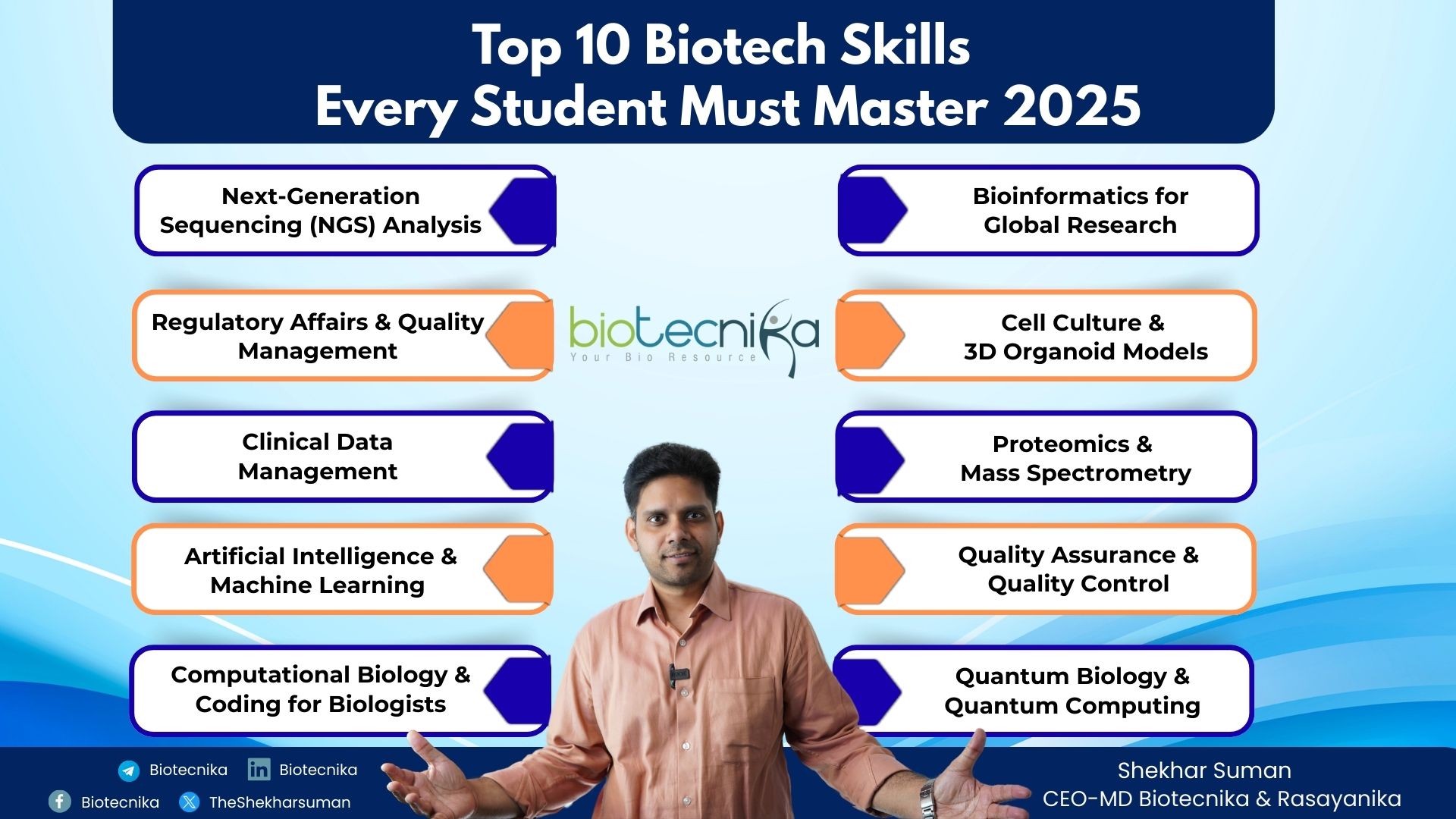Essential Biotech Techniques: Top 10 Skills Students Must Master in 2025
What do quantum physics, artificial intelligence, and living human organ models have in common? They are no longer just buzzwords anymore. Instead, these advancements are shaping the future of science today. Yes, you read it right. With bold ideas and powerful data, researchers are pushing science beyond its limits.
The beauty of biotech lies in its ability to surprise us. It reveals new worlds inside the smallest cells and opens doors to solutions we never imagined. Additionally in the coming years, researchers will not just study life. They will engineer, model, and even simulate it using quantum computers.
However if you are still thinking about whether these technologies will change the biotech industry. Then, my dear future scientist, the right question is whether you have the right toolkit for exploring that world. Therefore, Master these essential biotech techniques in 2025, and you won’t just witness the future of science. You will help create it.
1. Mastering NGS Analysis – The DNA of Future Biotech
NGS has changed the way we study genetics and genomics. This breakthrough enables researchers to sequence whole genomes in just a few days. Earlier, this process used to take years. Now Today, Today, as a result, NGS stands at the center of precision medicine, evolutionary biology, agricultural biotech, and many more.
Key Skills to Master
- Library preparation for DNA/RNA samples
- Quality control checks (e.g., FASTQC)
- Read alignment and variant calling
- Genome annotation & interpretation using bioinformatics tools
Why does it matter in 2025?
As the cost of sequencing is dropping, researchers with strong NGS skills will be in demand. They are highly valued in projects such as pathogen monitoring, rare disease diagnosis, and personalized medicine.
2. Regulatory Affairs & Quality Management
Discovering something new is just the beginning. Turning them into a safe, market-ready biotech product requires navigating through a complex network of the regulatory landscape. Regulatory affairs must ensure that these products meet legal, safety, and regulatory requirements across countries.
Essential Biotech Skills to Master
- Understanding GMP (Good Manufacturing Practices) and GLP (Good Laboratory Practices)
- Preparing regulatory submissions
- Managing product approval timelines
- Familiarity with ISO standards and compliance audits
What’s the importance of Essential Biotech Techniques in 2025?
As global demand for biotech products continues to rise, companies must meet regulatory compliance requirements. A skilled regulatory affairs professional can act as a bridge between science and regulatory compliance.
REAL TRAINING. REAL PROJECTS. REAL RESULTS
Global Regulatory Affairs Hands-on Training Program – Admissions Open!
Get job-ready in 8 weeks!
Batch Starts – 21st August 2025
3. Clinical Data Management
Clinical trials and data management have always been the backbone of biotech and pharmaceutical research. With accuracy, safety, and compliant data handling, the trial results ensure reliability.
Important Skill Sets
- Clinical trial protocols and phases
- Electronic Data Capture (EDC) systems
- Data cleaning and validation
- Regulatory compliance (FDA, EMA, ICH guidelines)
Why is it one of the essential biotech techniques in 2025?
As technology advances, clinical trials are becoming the most crucial step in launching biotech products. A skilled data manager will be crucial for maintaining the accuracy and reliability of study data.
You can Learn Clinical Data Management with Biotecnika – CLICK HERE
4. Artificial Intelligence & Machine Learning
AI & ML have become an integral part of the biotech industry. They are now used in genomics research, drug discovery, and diagnostics. These tools help the researchers process datasets, detect patterns, and predict biological outcomes.
Key Areas to Master
- Applying machine learning models to biological datasets
- Using AI for drug target prediction
- Image recognition for cell and tissue analysis
- Integrating AI tools with bioinformatics pipelines
Why is it crucial for 2025?
Consequently, Biotech firms and research institutions are looking for biologists who can work in interdisciplinary fields. Researchers must collaborate with data scientists to analyze large datasets and solve complex biological problems more efficiently and accurately.
5. Computational Biology & Coding for Biologists
In today’s biotech landscape, you cannot just depend on pipettes. You need coding too. Computational biology is crucial for bridging the gap between experimental science and computational modeling.
Essential Biotech Techniques in 2025
- R & Python programming for biological data
- Statistical analysis and data visualization
- Sequence alignment and molecular modeling
- Database management for genomic and proteomic datasets
Key relevance for the year ahead
For example, From simulating protein folding to predicting disease outbreaks, computational skills allow life scientists to work at the cutting edge of interdisciplinary research.
6. Bioinformatics for Global Research
Scientific research unites researchers worldwide. They collaborate and share data to make significant discoveries. Bioinformatics has emerged as one of the standard tools that helps scientists collaborate on these projects.
Important Skills You Need
- Multi-omics data integration
- Cloud-based bioinformatics workflows
- Data sharing standards and security protocols
- Collaborative research tools and platforms
Why is it one of the essential biotech techniques in 2025?
Additionally, With projects such as the Human Cell Atlas and global pathogen monitoring networks are expanding. Now, Bioinformaticians can work with international researchers effortlessly and be highly valued.
7. Cell Culture & 3D Organoid Models
Cell culture has been an essential tool in biotechnology for many years. Now, 3D organoid technology is helping scientists create models that closely resemble real human tissues more accurately than ever before. These models are revolutionizing drug testing and disease research.
Key Skills to Master
- Aseptic handling techniques
- 2D and 3D culture systems
- Stem cell differentiation into organoids
- Co-culture and microfluidics systems for advanced modeling
Why it matters in 2025
Organoid models are increasingly replacing animal testing in pharmaceutical R&D. There is a rising demand for researchers trained in these systems.
Learn 3D Organoid Systems & Stem Cell Engineering – CLICK HERE TO ENROL
8. Proteomics & Mass Spectrometry
While genomics looks at genes, proteomics studies the proteins produced by genes. The studies explain the levels, interactions, and changes the proteins undergo. Gas Chromatography–Mass Spectrometry (GC-MS) and Liquid Chromatography–Mass Spectrometry (LC-MS) play a key role in this process.
Key Skills to Master
- Sample preparation and fractionation
- LC-MS/MS and GC-MS operation
- Protein identification and quantification
- Data analysis using specialized software (MaxQuant, Proteome Discoverer)
Why is it one of the essential biotech techniques in 2025?
Proteomics plays a crucial role in identifying disease markers, developing personalized medicine, and understanding the progression of illnesses, fields that are expanding rapidly.
9. Quality Assurance & Quality Control (QA/QC)
QA/QC ensures that biotech products are safe, effective, and of consistently high quality before they reach the market. This is important for building trust with customers, regulators, clients, and the public.
Important skill sets
- Standard Operating Procedures (SOPs) creation
- Batch testing and stability analysis
- Quality audit preparation
- Understanding of ISO, GMP, and GLP requirements
Key relevance
As the scale of biotech manufacturing continues to increase globally, these professionals play a critical role in ensuring product reliability.
10. Quantum Biology & Quantum Computing in Life Sciences
Why quantum? Quantum biology explores how quantum mechanics works in biological systems. From photosynthesis to olfaction, Quantum computing offers new insights into complex biological processes at extraordinary speed.
Key competencies
- Basics of quantum mechanics relevant to biology
- Quantum algorithms for molecular simulations
- Applications in protein folding and drug design
- Cross-disciplinary communication between physicists and biologists
Why it matters in 2025
While still an emerging field, quantum biology could unlock breakthroughs in energy efficiency, disease modeling, and computational biology that are impossible with classical methods alone.
Essential Biotech Techniques in 2025 and Corresponding Biotecnika Courses – Complete Skills Mapping
| Essential Biotech Technique | Biotecnika Course(s) | Key Skills Covered | |
| 1 | Next-Generation Sequencing (NGS) Analysis | Next-Gen Sequencing (NGS) Hands-On Internship Next-Gen Sequencing & Multi-Omics Data Analysis Internship with Project Work | Genome sequencing, variant calling, bioinformatics analysis, NGS pipelines |
| 2 | Regulatory Affairs & Quality Management | Global Regulatory Affairs Training | GMP compliance, product approval, regulatory submissions, and documentation |
| 3 | Clinical Data Management | Clinical Data Management Training + Project | Clinical trial data handling, database systems, and compliance with ICH-GCP |
| 4 | Artificial Intelligence & Machine Learning in Bioinformatics | AI/ML in Bioinformatics & Biology Industrial Training + Project | Predictive modeling, AI algorithms, and biological data analysis |
| 5 | Computational Biology & Coding for Biologists | Data Science + Coding for Biologists Training + Project | R/ Python programming, statistical analysis, bioinformatics scripting |
| 6 | Bioinformatics for Global Research | Bioinformatics Global Research Training + Project | Multi-omics data analysis, global research collaboration, bioinformatics pipelines |
| 7 | Cell Culture & 3D Organoid Models | Cell Culture & 3D Organoid Models Training | Aseptic techniques, organoid culture, tissue engineering |
| 8 | Proteomics & Mass Spectrometry | GC-MS (Gas Chromatography–Mass Spectrometry) Workshop, LC-MS (Liquid Chromatography–Mass Spectrometry) Workshop | Protein profiling, biomolecule identification, and analytical chemistry |
| 9 | Quality Assurance & Quality Control (QA/QC) | QA/QC Online Industrial Training | ISO, GMP, GLP compliance, QA/QC documentation, testing protocols |
| 10 | Quantum Biology & Quantum Computing in Life Sciences | 2-Day Workshop on Quantum Biology & Quantum Computing | Quantum mechanics in biology, molecular simulations, and quantum algorithms |
Strategies for Mastering These Essential Biotech Techniques
- Break down your learning goals into monthly and weekly milestones.
- Combine reading and coursework with hands-on projects and internships.
- Don’t stop learning about other fields. Learn how different techniques can be used in biology.
- Follow the latest research papers, patents, and biotech news.
- Interact with friends and mentors to share knowledge and explore opportunities.
Biotech offers limitless opportunities. Learning these essential biotech techniques in 2025 prepares you not only for a career but also for a future in the biotechnology field. field, and more importantly, to make an impact. You will gain the skills to drive innovation, advance research, and help push the frontiers of science.
The road ahead is exciting, full of unanswered questions and untapped potential. And the best part?
Ultimately, These tools are already shaping the future of science. So, Start learning now, and keep exploring, because my dear future scientist, every skill you gain is another step towards discovering the world beyond our imagination.

































I am interested in all theses course.and waiting for opportunities to be enrolled
My dream like I clear neet jam exam and then phd
My dream phd
Nice
The article was very insightful
Helped me learn about demanding skills